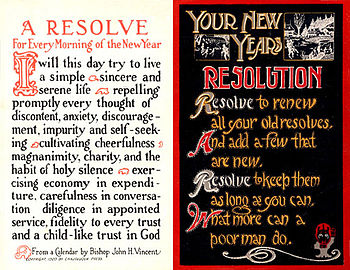New Year's resolution: Difference between revisions
→Success rate: Vandalism removed |
|||
| Line 23: | Line 23: | ||
== Success rate == |
== Success rate == |
||
Recent research shows that while 52% of participants in a resolution study were confident of success with their goals, only 12% actually achieved their goals. Men achieved their goal 22% more often when they engaged in goal setting, a system where small measurable goals a pound a week, instead of saying "lose weight"), while women succeeded 10% more when they made their goals public and got support from their friends.<ref>[http://www.quirkology.com/UK/Experiment_resolution.shtml Quirkology Study]</ref> |
Recent research shows that while 52% of participants in a resolution study were confident of success with their goals, only 12% actually achieved their goals. Men achieved their goal 22% more often when they engaged in goal setting, (a system where small measurable goals are being set, such as, a pound a week, instead of saying "lose weight"), while women succeeded 10% more when they made their goals public and got support from their friends.<ref>[http://www.quirkology.com/UK/Experiment_resolution.shtml Quirkology Study]</ref> |
||
== References == |
== References == |
||
Revision as of 14:19, 26 July 2010
This article has multiple issues. Please help improve it or discuss these issues on the talk page. (Learn how and when to remove these messages)
No issues specified. Please specify issues, or remove this template. |
A New Year's resolution is a commitment that an individual makes to a project or the reforming of a habit, often a lifestyle change that is generally interpreted as advantageous. The name comes from the fact that these commitments normally go into effect on New Year's Day. Some examples include resolutions to donate to the poor more often, to become more assertive, or to become more environmentally responsible.
There are religious parallels to this secular tradition. People may act similarly during the Christian fasting period of Lent, though the motive behind this holiday is more of sacrifice than of responsibility. During Judaism's New Year, Rosh Hashanah, through the High Holidays and culminating in Yom Kippur (the Day of Atonement), one is to reflect upon one's wrongdoings over the year and both seek and offer forgiveness. The concept, regardless of creed, is to reflect upon self-improvement annually.
Popular goals

Popular goals include resolutions to:[1]
- Improve health: lose weight, exercise more, eat better, drink less alcohol, quit smoking
- Improve finances: get out of debt, save money
- Improve career: get a better job
- Improve education: improve grades, get a better education, learn something new (such as a foreign language or music)
- Improve self: become more organized, reduce stress, be less grumpy, manage time, be more independent
- Take a trip
- Volunteer to help others
Success rate
Recent research shows that while 52% of participants in a resolution study were confident of success with their goals, only 12% actually achieved their goals. Men achieved their goal 22% more often when they engaged in goal setting, (a system where small measurable goals are being set, such as, a pound a week, instead of saying "lose weight"), while women succeeded 10% more when they made their goals public and got support from their friends.[2]
